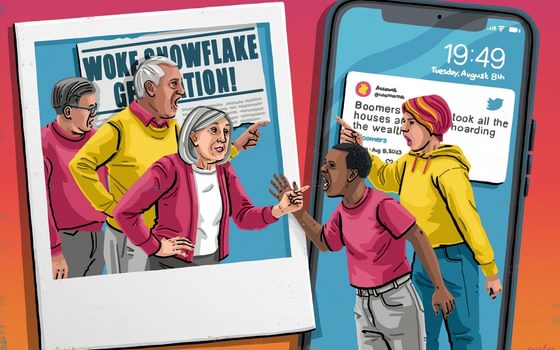What world do we want to return to?
How a new economy can help build something better
12 July 2021
This is the editorial from the third issue of the New Economics Zine. You can read the full issue here
“We’re moving into a new world!” people said. “We can’t go back to normal – hard truths have been learned and new possibilities have suddenly opened up!” But, 16 months after the UK went into its first lockdown, some things haven’t changed. The government is still obsessed with the size of the public debt and trying to push through fossil fuel infrastructure projects. It doesn’t seem likely that we’ll be stepping into a new world come autumn – but perhaps the pandemic has supercharged shifts that have been happening slowly for some time.
At the New Economics Foundation (NEF) we, of course, think that we need a new economy (what gave it away?) and there have been some moves in the right direction: the government has supported people who have lost out on work through the furlough scheme, and made big noises about a green economic recovery from the pandemic. But we are still living in an economic system that doesn’t support us when we need it, that burns through the earth’s resources, and that values arbitrary measures of economic success over how happy and healthy we are – clearly, there is much further to go.
In a world where families have to choose between good healthy food or new school shoes for their kids, where 100 companies are responsible for 71% of global emissions, where the carbon emissions of the richest 1% are more than double the emissions of the poorest half of humanity, and where a nurse can’t afford a home in 74% of the country, it feels so obvious that change is necessary. So it’s easy to think that the case has been made and the argument won. Even the government are sensing a shift as they promise ‘real’ change through levelling up, investment in communities and taking the climate crisis seriously.
The now-famous Arundhati Roy quote that has graced the pages of this publication before goes: “Another world is not only possible, she is on her way. On a quiet day, I can hear her breathing.” The idea of change is a slippery one – it can be hard to envisage, and yet the very thought can be terrifying. The pandemic has caused things to shift – some things will have changed forever, and others may flip back in the coming weeks. Change is not an inevitability or always a good thing – the status quo has untold strength. Talk of ‘going back to normal’ by those who do not understand why ‘normal’ wasn’t so great for many in this country belies both a safety in the familiar and a failure to learn the lessons of our prepandemic economy. But this is no accident – it a result of the way our economy is designed. There is power embedded in ‘how things just are’. If we want change, we must make it happen. So, if a new world is on the horizon the real question is: will it be the one we want to see?
In this issue we explore the different ways the world is changing – looking at old challenges and new, from ownership over vaccines and the future of travel through to increased pressure on our social care system and consumption-driven economic growth. And each piece contains within it a challenge for how we might move things forward and how we might begin to shape the world we want to live in.
The problems with our economy predated the pandemic. Covid-19 may have highlighted more people using food banks, the struggles of small businesses, and a government more preoccupied with the size of the deficit than funding the NHS – but it didn’t create these problems. In our scene-setting essay for this issue, our new head of economics Lydia Prieg explains how we got here, and why we’re facing a once-in-a-lifetime opportunity to build a fairer, more sustainable economy. To do this, however, will take the government focusing on something other than maximising GDP. Beth Stratford explains how, from high levels of individual debt to the lack of a strong social security system, our economy has become dependent on constant growth – and how we can end the straitjacket of growth dependence.
Over the last year and a half most of us have thought more about our health and wellbeing than ever before. Yet our NHS is struggling after a decade of cuts, and our social care system neither provides adequate affordable care for those who need it, nor does it support the key workers who keep it going. NEF’s own Daniel Button takes a look at the toll the pandemic has taken on our care system and argues for a truly universal access to social care. At the same time, access to vital medical technology and development like the Covid vaccines is determined by a global system of intellectual property which has fuelled vaccine nationalism. Miriam Brett explains how it all works in this issue’s explainer essay.
Emerging from the pandemic into a new economy cannot mean ignoring the voices of the most marginalised. After a year of relentless media bigotry against trans people, Fergal O’Dwyer interviews trans organiser and educator Nim Ralph about how the economy shapes trans lives. Disability justice activist Lani Parker writes about the dangerously simplistic portrayals of disabled people throughout the pandemic, and how a new understanding of vulnerability can pave a way forward. Minnie Rahman explains how the government’s hostile environment policies have meant that migrants have been disproportionately exposed to the virus. And after a year of being told to stay at home, our local areas have dominated our lives like never before. In their piece for this issue a team of young researchers talk us through their investigation into what the rampant gentrification of south London is doing to the wellbeing of the young people who call it home.
These challenges and opportunities fall against the backdrop of the ever-worsening climate crisis. The government pumped huge amounts of money into the aviation industry over the past year, even though we know how much is has damaged the climate. Alex Chapman uses the story of aviation to show how government decisions can create the behavioural changes we need. But without a thorough understanding of the economy and power, we cannot hope to get there. That’s the message of the new book Planet on Fire, reviewed by Margaret Welsh in this issue.
Some problems the pandemic has brought into the light. Some are deep and embedded in our economy. But our issue ends with Christine Berry setting out the case for why the uncertainty we’re all swimming in can actually be the best grounds for hope.
While this issue delves into many of the challenges we are already facing, and those coming down the line, it does so with that hope. It is more important than ever that we use our voices and build power to have a say in the kind of world we live in. That’s why at NEF we have just launched a campaign for a Living Income – to fight to create a social security system that will ensure everyone has enough to make ends meet. The climate disaster is unfolding before our eyes, from the pipeline explosion in the Gulf of Mexico to deadly heatwaves in the US, Canada, and Pakistan. And as we look towards this autumn’s UN climate summit, we are beginning our work fighting for a new deal to bring about an economy that is not just fair but green. As Christine Berry’s long read in this issue reminds us, via Rebecca Solnit: “Hope locates itself in the premises that we don’t know what will happen and that in the spaciousness of uncertainty is room to act.”
We hope you enjoy this issue of the New Economics Zine and that it gives you hope, inspiration for action and food for thought when looking to the future.
Topics Zine






